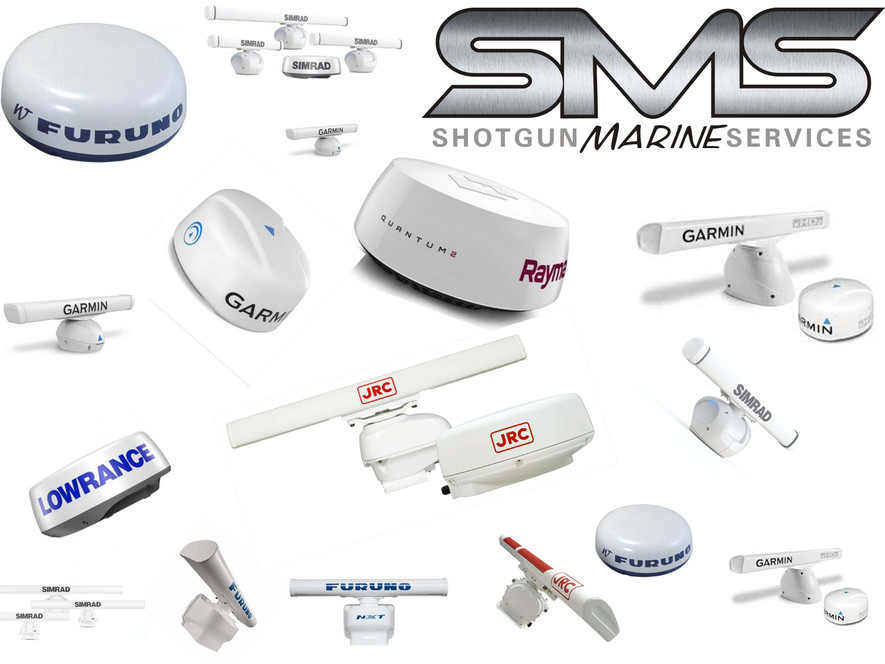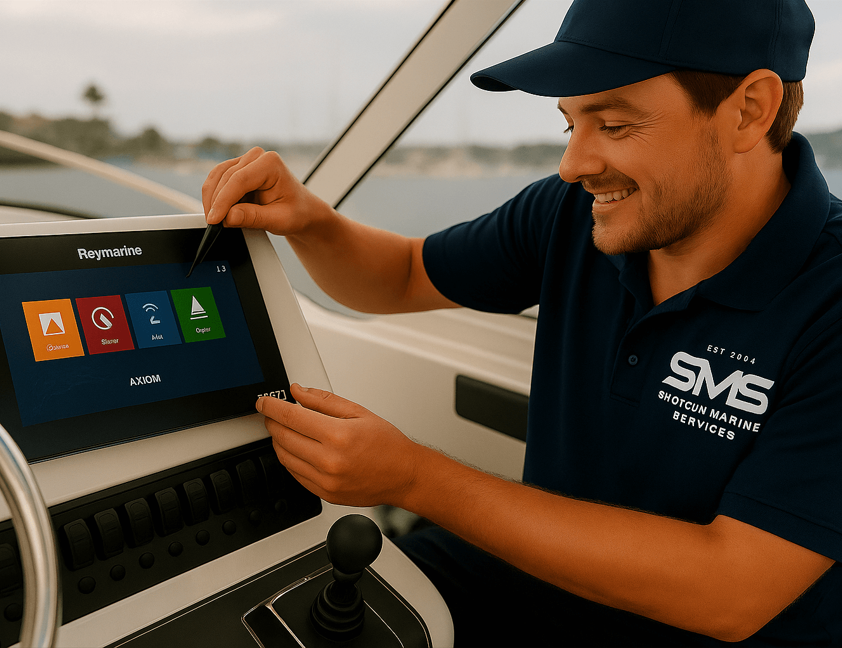Garmin, Raymarine, Simrad enclosed radars compared.
By Ben Stein-Panbo.
RELEASED DECEMBER 30, 2022 REVISED DECEMBER 30, 2022
Here at Shotgun Marine, we are always looking for great content for our Australian customers.
Ben Stein gives us an indepth comparison of Garmin, Raymarine and Simrad Enclosed Radars.All credit goes to him for his dedication to the Marine market resarch and insight. Below are his thoughts.Although some images are US related, you will get the idea and be able to make a more informed decision when you are trying to fitout your vessel with a new radar. Here's his thoughts........
My first Radar comparison produced a great conversation about the results as well as highlighted some opportunities get back out on the water and complete some extra testing. I'm back with component 2 and the outcomes of that added testing. I've been able to examine some extra situations, various setups, as well as extra attributes of all 3 radars.
Gain on Garmin Fantom 18x


Garmin Fantom 18x in harbor with gain in "Automated High"
Garmin Fantom 18x in Harbor with gain set the default "Automatic Low"
Unlike the other 2 radars, Garmin's auto gain settings can be set to low or high. By default, the harbor predetermined uses automated low gain. For the first set of screening, I didn't override any one of the defaults of the particular presets, with the exception of variety, to ensure that all screenshots matched. In this instance, I did change the Fantom 18x automated high. The substantial bulk of this round of screenshots remain in automated high. I did see some exaggeration of targets with greater gain, however in general, I assume it's a renovation. The screenshots over program automatic high (on the left) as well as auto low (on the right) in virtually the exact same position.
Ft Myers US Images Part 2

Garmin Fantom 18x- Radar returns on Caloosahatchee at the Edison bridges
Raymarine Quantum 2- Radar returns on Caloosahatchee at the Edison bridges
Simrad Halo 20+- Radar returns on Caloosahatchee at the Edison bridges
Google EARTH sight of the boat's place
This contrast is really comparable to one from component 1, yet this time around with the Garmin in auto high gain. Also, you might have noticed I slipped up by leaving the Simrad in its offshore preset instead of harbor. Although the Halo 20+'s efficiency may be a little jeopardized, it still shows fairly well. As a matter of fact, I think I 'd still rank its return initially, followed very carefully by the Fantom and then the Quantum 2.
Dual-range



Garmin Fantom 18x- double range screen
Raymarine Quantum 2- double radar screen, yet not dual array
Simrad Halo 20+- dual variety display
The Garmin Fantom 18x as well as Simrad Halo 20+ both deal dual-range capacities. The Halo 20+ presents both virtual radars as nearly totally different units. Each virtual unit can be powered backwards and forwards separately and all changes other than rotational rate can be individually managed. Garmin does not develop 2 online radars, but does enable nearly all criteria be readjusted separately.
Bird mode


Garmin Fantom 18x - Bird setting
Simrad Halo 20+- Bird mode The Garmin as well as Simrad radars both provide bird mode. Circling around birds are a sign of lure fish compelled the surface by larger predator fish. Those killers are typically just what fishermens seek. So, the suggestion is that if your radar can aid you identify birds, you can place on your own on fish. I spent a while trying tune both the Simrad and Garmin systems to show me birds with very little success. One-time, I got a couple of fluttering returns from a big flock of birds. Overall, I got the impression that the fairly low power- compared to larger open arrays, whether solid-state or magnetron based of the enclosed selections makes discovering birds a reach.
Radar overlay



Garmin Fantom 18x - Radar overlay
Raymarine Quantum 2- Radar overlay
Simrad Halo 20+ - Radar overlay
Some boaters speak highly of radar overlay as a terrific way to preserve situational understanding. I've never ever located it particularly practical and think I miss a lot more radar returns in overlay than I do on a conventional scope. I mean it all boils down individual preference. But, I discovered a large distinction in the convenience of interpreting the returns from each radar device when overlayed on a chart. The Raymarine and also Simrad returns were both simple spot and rather clear.

On the other hand, the Garmin GPSMap 943xsv the default is blue shade scheme for radar overlays. I found this shade really hard to spot. Although the default blue was tough visually for me, there are alternatives. The good news is, the color is selectable. I have actually used red in the screenshot, and it's a lot easier to see.



Garmin Fantom 18x- MARPA target and matching AIS target
Garmin Fantom 18x MARPA target info
Garmin 943 - AIS target information



Raymarine Quantum 2- MARPA target and equivalent AIS target
Raymarine Axiom AIS target info
Simrad Halo 20+ MARPA target info

Simrad Halo 20+ AIS target information
When paired with a heading sensor, each of the 3 radar units supports MARPA or miniature automated radar plotting aid. MARPA offers details about the rate, heading, family member bearing, range, closest factor of technique, and time to closest point of technique (TCPA) for tracked targets. For my screening, all three radars and also screens made use of the NMEA 2000 heading outcome of a Garmin MSC 10 satellite compass. I have actually found this compass give well-founded heading data, so I think the display screens were all getting good heading as well as position information.
As you can see in several of the screenshots above, MARPA as well as AIS signs are frequently superimposed straight on top of each other. Both technologies match each other and also supply confirmation of the information each provides. For AIS equipped vessels, I commonly really did not find it required get them through MARPA. But, it's not unusual to see AIS targets with wrong heading data. In those situations, acquiring the target via MARPA gives appropriate heading details on the vessel. Rates were often unpredictable with all three radars' MARPA handling All 3 radar units sometimes had problem giving accurate rate and heading numbers.
The snippet above from the Garmin radar reveals rates differing from a fairly accurate 5.2 mph all the way approximately over 25 mph. The target tracked in the video is the Pull Catherine from the previous set of screenshots. Safe claim, the yank as well as barge weren't really traveling at 25-plus miles per hour! In addition these errors, I viewed all three radar devices battle to track MARPA targets around large dealt with things. This was particularly acute as tracked targets passed under bridges. I usually watched the MARPA target circle move from a relocating boat a section fo the bridge as the watercraft passed under the bridge.
Raymarine doppler presentation

Raymarine Quantum 2- full collor, non-doppler presentation
Raymarine Quantum 2- white doppler discussion
Raymarine Quantum 2- full color doppler presentation
In my very first comparison, I kept in mind that Raymarine is the just one of the three radars alter the discussion when doppler setting is enabled. I only had a screenshot of the white doppler shade scheme, not the full-color one. As you can see above, when the complete color scheme is picked, the shades are extra low-key, and to my eye, there's less clarity in the non-doppler returns presented. I'm confident a future update may enable the exact same discussion on Raymarine systems.
My final thought after putting in many hrs comparing these radars - There are differences in exactly how each radar device carry out at various features as well as in various situations. Yet, in any one of these scenarios, cirmunstances and situations, I would confidently go sea with any one of these units.
Ben Stein Author of Panbo.com
Radar Prices and Stock we carry.
Product and Pricing Info Garmin Fantom 18
Product and Pricing Info Raymarine Quantum 2




